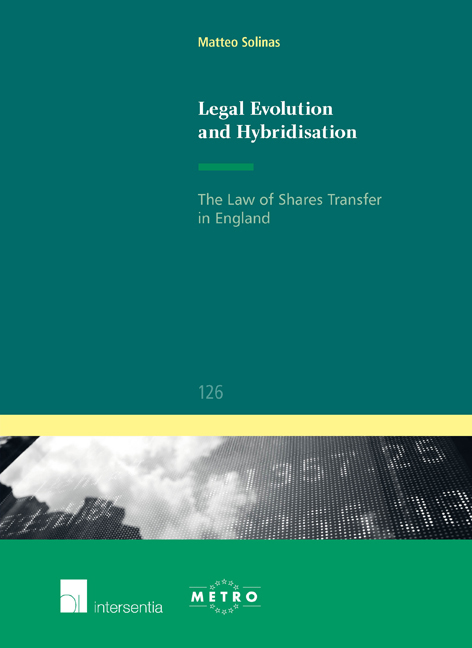Book contents
- Frontmatter
- Foreword
- Preface
- Acknowledgements
- Contents
- Table of Cases
- Introduction
- PART I THE IDEA OF HYBRIDITY IN COMPARATIVE LAW
- PART II THE CIRCULATION OF SHARES
- PART III THE TRANSFER OF (INTERESTS IN) SHARES
- Introduction to Part III
- Chapter 6 Indirect Holding and the Process of Legal Evolution
- Chapter 7 The Protection of the Innocent Transferee of Intermediated Shares
- Summary of Part III
- Conclusions
- Bibliography
- IUS COMMUNE EUROPAEUM
Chapter 7 - The Protection of the Innocent Transferee of Intermediated Shares
from PART III - THE TRANSFER OF (INTERESTS IN) SHARES
Published online by Cambridge University Press: 22 November 2017
- Frontmatter
- Foreword
- Preface
- Acknowledgements
- Contents
- Table of Cases
- Introduction
- PART I THE IDEA OF HYBRIDITY IN COMPARATIVE LAW
- PART II THE CIRCULATION OF SHARES
- PART III THE TRANSFER OF (INTERESTS IN) SHARES
- Introduction to Part III
- Chapter 6 Indirect Holding and the Process of Legal Evolution
- Chapter 7 The Protection of the Innocent Transferee of Intermediated Shares
- Summary of Part III
- Conclusions
- Bibliography
- IUS COMMUNE EUROPAEUM
Summary
This final substantive chapter draws on the discussion on the general law reform developed in Chapter 6. It considers in greater depth the specific property law issue of whether the innocent purchaser for value of intermediated shares is adequately protected under English law. In line with the FMLC and the Law Commission, section 1 argues that this is not the case. Existing legal concepts do not adequately meet the practical needs of investors in intermediated shares and legislative intervention is highly desirable to keep up with changing financial practice.
Without dwelling on the possible defences against equitable personal claims, section 1 contends, in particular, that there is a disparity in the degree of protection available along the chain of indirect holding, apparently without justification. Building on this inconsistency, section 2 confronts the situation with the Italian legal framework and UCC Article 8 in order to offer a critical comparative background for the discussion on legal change addressed in section 3. It is in that context that the law reform proposals are examined and how they reflect a process of hybridisation of national models is shown. This outcome is consistent with the general analysis presented in Chapter 6 and reiterates with greater emphasis and depth the arguments of this study on the significance of comparative law to understand the pattern of legal evolution in terms of a process of cultural interaction and hybridisation.
The English Legal Framework
As stated in Chapter 6, section 1, the conventional legal characterisation of indirectly held shares in England is based on the device of trust. In the indirect holding system, account holders retain an equitable interest in the pool of shares held by the relevant intermediary. This is different from the pattern of direct holding where investors enjoy a direct relationship with the issuer and maintain an absolute right in the shares.
The distinguishing elements of holding and transfer directly held shares have been spelt out in Chapter 4. This section clarifies the significance for an account holder of having an equitable interest in shares rather than a legal title, and specifies how equitable interests circulate under English law (section 1.1). It is only against this background that the legal position of the innocent purchaser of directly held shares can be evaluated (section 1.2) and properly compared with the one available for the transferee of intermediated shares (section 1.3).
- Type
- Chapter
- Information
- Legal Evolution and Hybridisation , pp. 175 - 212Publisher: IntersentiaPrint publication year: 2014



